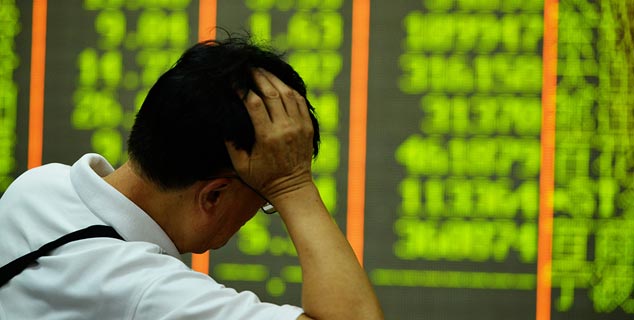
China is rattling markets around the world.
The Shanghai Composite Index tanked this morning, falling by the most since February 2007 – down more than 8%.
It followed economic data showing that Chinese industrial profits had fallen in June compared with the previous year, while manufacturing activity is dropping too.
So is this the end of China’s growth story?
Or is it just the beginning?
Why is the Chinese stockmarket plunging?
The Chinese economy is slowing down. Commodity prices and the value of ‘commodity currencies’ (such as the Australian dollar) are collapsing, amid fears that demand is gone for good.
Meanwhile, the rampant stockmarket surge we saw over the last year or so has come to an end. A market that more than doubled is now seeing a painful correction. Chinese stocks had managed – with the help of the government – to bounce back by around 16% from their 8 July low. But today saw a huge plunge in both mainland Chinese shares and Hong Kong markets.
It’s probably not just weak growth that’s unnerving investors. They might also be concerned about the government’s commitment to keeping the stockmarket propped up.
The International Monetary Fund (IMF) has been telling China that, while it’s OK to intervene in markets sometimes (they can hardly complain about it after all), ideally “prices should be allowed to settle through market forces”, reports Bloomberg. China responded by saying that all the measures they’ve put in place to prop up the market should be considered temporary.
China is seen as wanting to keep the IMF happy at the moment. So investors may be a little worried about the longevity of the government’s commitment.
“Investors are afraid the Chinese government will withdraw supporting measures from the market”, as one analyst told Bloomberg. “Once those disappear, the market cannot support itself.”
Slower growth for China is inevitable
But take a step back and this isn’t quite as astonishing as the market volatility might make it seem. For a start, when a market rises at the rate China’s has, you can’t expect the inevitable corrections to be pretty.
Meanwhile, as far as the growth slowdown goes, this is entirely to be expected as well. As Roger Bootle notes in The Daily Telegraph, slower growth is an inevitable aspect of economic development. “When a country is extremely poor and undeveloped, it is easy to register rapid growth rates. China’s slowdown… is fully in line with the experience of other east Asian countries.”
In other words, we’ve seen this particular development model before. And it turned out pretty well for South Korea and Japan, for example.
Concerns about the government’s desire or ability to manage the stockmarket are perhaps more valid, in that the response so far has been rather panicky.
But then again, markets across the globe have been managed and intervened in heavily for many years now. The eurozone has only stuck together over the last few years because European Central Bank governor Mario Draghi said he would “do what it takes” to keep it all going.
And elsewhere in the world, we’ve got investors biting their nails over the impact of the Federal Reserve and the Bank of England potentially raising interest rates by minuscule amounts.
So ironically enough, China – perhaps the most heavily-controlled major economy in the world – is about the only place in the world where investors aren’t showing complete faith in the ability of policymakers to control and support the markets.
It might take the Chinese a while to get to grips with the best way to wield their power, but at the end of the day, if they want to avoid a destabilising crash in the stockmarket, they can do it. It also helps that they have a lot more room to cut interest rates if they decide to, than most other countries right now.
These are growing pains, not the end of the growth era
The thing is, as an investor, you can’t expect an evolving financial system, and one accustomed to highly centralised government control, to give you a smooth ride.
But at the same time, if you’re willing and able to cope with the ups and downs, then the long-term outlook for China remains attractive. As my colleague Merryn has pointed out in the past, there are similar examples across Asia which suggest that China could be at the start of a long bull market, rather than on the verge of collapse.
In short, what we’re seeing here is a nasty bout of growing pains. In the longer run, we’d expect a sustainable bull market to take hold. Rupert Foster, an Asia expert and MoneyWeek contributor looked at ways to invest in China in a recent issue of MoneyWeek magazine.
If you’re not already a subscriber, get your first four issues free here.